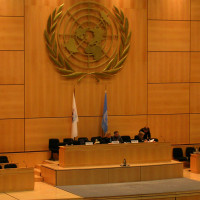Business and Human Rights: The Failure of Self- Regulation Global Campaign To Dismantle Corporate Power And End Impunity
Topics
The “Global Campaign to Dismantle Corporate Power and Stop Impunity” is an initiative of social movements and communities from all over the world affected negatively by corporations. It seeks to denounce the “architecture of impunity” that benefits corporations, and is fighting for a binding international treaty which would give human rights precedence over trade regulations. Another project is that of a “Peoples’ Centre”, which would document corporate abuse and offer alternatives.

Daniel Avard
This article appeared in Passerelle no. 14 by The ‘Coredem’ initiative.

Daniel Avard
“Self-regulation does not work. We need binding regulations. Now.”
That was the message of Alfred de Zayas, the United Nations (UN) Independent Expert for the promotion of a democratic and equitable international order. He was addressing the Catalan Parliament as part of a day dedicated to “Transnational Corporations and Human Rights: the road to binding regulations”, referring to the obligation that corporations have to respect human rights wherever they operate. Surprising as it may seem, given that human rights are now universally recognised, there is a total void in effective protection at international level. This article will explain what this lack of protection means, and how a global process of mobilisation can change this situation by putting forward real alternatives.
One of the principal characteristics of capitalist globalisation is the clearly asymmetrical relationship between transnational corporations and the people. Thus an unequal relationship has been created between corporations, whose interests are reflected in public policy, and the rest of the population, who see their rights being subordinated to the power of the major multinationals. This is the new lex mercatoria; the interests of the transnational corporations are very effectively safeguarded through contracts, trade regulations and multilateral, regional and bilateral investment agreements and by the decisions of international arbitration tribunals, such as the World Bank’s International Centre for the Settlement of Investment Disputes (ICSID). And yet no mechanisms exist to protect the rights of peoples or of Nature.
At a global level, the United Nations Conference on Trade and Development has identified more than 3,400 free trade agreements and treaties to protect investments, which involve binding legal frameworks.
In Europe, this issue gained prominence in the media during the controversial negotiation with the United States on the “Transatlantic Trade and Investment Partnership” (TTIP), and the “Comprehensive Economic Trade Agreement” (CETA) between the EU and Canada. These highlighted the erosion of democracy inherent in a secret negotiation process. Criticism also focussed on specific aspects of the treaties such as regulatory cooperation promoting downward harmonisation of wages and social and environmental standards or the arbitration mechanisms between investors and states, whereby transnational corporations can sue states if they consider their interests are being undermined.
These are very real issues for the majority of countries in Latin America, Africa and Asia, under pressure from the United States and European Union to sign similar treaties. But such agreements would undermine regional dynamics that could potentially strengthen the economies of poorer countries. This was what happened to the Andean Community, which split after signing bilateral treaties with the USA and the EU. And yet it is difficult for these countries to say no to such agreements, as illustrated by the ultimatum the EU recently gave to a number of African countries, requesting they sign the Economic Partnership Agreements (EPAs) and approve their provisional entry into force (pending ratification by their parliaments). If countries refuse, they risk an unsustainable increase in customs duties on European imports, which will have immediate and negative consequences for those countries that have specialized in the export of raw materials.
We will not go into the profoundly contentious and anti-democratic nature of the trade and investments regime, as there is already extensive literature available on the subject.
What interests us here is to highlight the contrast between the binding regulations that protect the interests of investors, and the fragile legal framework represented by international human rights law, which is incapable of “resisting” the power of the lex mercatoria. This discrepancy is even more striking when one considers that voluntary standards or “codes of conduct” are the way in which multinationals are being requested to respect human rights. In addition to the fact that this essentially results in a privatisation of justice, through the existence of arbitral tribunals that overrule national legislation or international law, this asymmetry is also evident in the obstacles faced by communities and individuals attempting to assert their rights. That is where there is an inherent and systemic violation of human rights and the rights of peoples and the environment in the operations of transnational corporations. A real “Architecture of Impunity” is established, and the dispossession and appropriation of the commons goes on.
Unfortunately, there are countless examples of impunity and many lives have been lost due to “accidents” caused by the unbridled quest for cost-cutting and by repressing the voices of the people: Bhopal in India, Rana Plaza in Bangladesh, the destruction of the Niger Delta by oil companies like Shell, the environmental disaster caused by Chevron-Texaco in the Ecuadorian Amazon and by Vale in Brazil, the Marikana massacre in South Africa . . . the list goes on.
However, resistance to this situation has remained strong. It began firmly rooted in the local but has increasingly taken on a regional and international dimension. The Global Campaign to Dismantle Corporate Power and End Impunity,comprises 200 organisations and social movements in Africa, Asia, Europe and the Americas. One of its main precursors is the Bi-regional Enlazando Alternativas Network between Europe, Latin America and the Caribbean.
Among the different actions undertaken by the network, it is worth highlighting the Permanent
People’s Tribunal, a descendent of the Russell Tribunal. The Tribunal has enabled communities affected by European transnational corporations in Latin America to have their voices heard and denounce violations in coordination with European civil society organizations. The sessions and hearings in Vienna (2006), Lima (2008), Madrid (2010), and Geneva (2014) exposed the wrongdoings of a whole host of European corporations from a number of different sectors. Companies such as Repsol, BP, Shell, HSBC, Glencore, Suez (today Engie), Rabobank, BBVA, Unilever, Telefónica, Andritz, Bennetton, Unión Fenosa-Gaz Natural, Iberdrola, Veolia, Thyssen
Krupp, Syngenta, Bayer, Endesa, Louis Dreyfus, Nestlé, and others, were repeatedly singled out, condemned for systematically violating human rights. Further analysis also led the Tribunal to denounce lobbying within European institutions and governments, which actively defend the interests of private European corporations.
The Enlazando Alternativas Network, comprising various organisations and networks, decided to form a global movement to curb the impacts and impunity of multinationals. That is how the Global Campaign to Dismantle Corporate Power and End Impunity came about. Launched in 2012 with the aim of com-piling peoples’ experiences and complaints, and creating spaces for resistance and alternatives, the intention was to extend the network beyond Latin America and Europe to the rest of the world.
As well as focussing on popular mobilisation and solidarity, the Global Campaign also developed the International Peoples’ Treaty on the Control of Transnational Corporations,as a political instrument that lays the foundations for an alternative vision of the law and justice “from below”. It also aims to provide a context where communities and social movements can join forces and reclaim the public space, hitherto occupied by corporate powers. It thus has two dimensions: a legal aspect and a section focussed on alternatives. This latter includes a number of relevant experiences, demands and practices that seek to reclaim democracy and re-establish the importance of the public interest, rebuild sovereignties and defend collective rights, and demonstrate that alternative economies can and do exist.
In regards to the legal dimension, the main objective of this initiative is to subordinate the juridical-political architecture that sustains the power of transnational corporations to human rights norms and rules. The Peoples’ Treaty focuses on two main strategies.
The first of these strategies is being put into practice within the UN Human Rights council, aiming to reclaim the multilateral space that has been taken over by transnational corporations. By asserting that international human rights law is hierarchically superior to national and international trade and investment norms, the campaign aims to establish binding regulations that force transnational corporations to respect human rights. Since the 1970s, monitoring transnational corporations has been a problematic issue for the United Nations. There has been a number of unsuccessful attempts at establishing mechanisms that would force corporations to respect human rights, the most recent being that carried out by the Working Group created by the Sub-commission for the Promotion and Protection of Human Rights – the United Nations Norms on the Responsibilities of Transnational Corporations and other Business Enterprises, approved by the Sub-commission in 2003. The corporate world’s reaction was to produce a document, signed by the International Chamber of Commerce and the International Organisation of Employers, stating that the Subcommittee’s project undermined both human rights and the rights and the legitimate interests of private business. It also stated that human rights obligations were the responsibility of states, not of the private sector, and it called on the United Nations Commission on Human Rights to reject the project approved by the Subcommittee. The Commission abandoned the project in 2005. Voluntary standards were set up instead, requiring companies to self-regulate: the Guiding Principles on Business and Human Rights, endorsed by the Human Rights Council in 2011.
What is most striking about the Guiding Principles is that they comprise no legal obligation whatsoever, thus leaving the regime of impunity totally intact. In light of this, a declaration was made at the United Nations in 2013, initiated by Ecuador and backed by the African Group, the Arab Countries Group, Pakistan, Kyrgyzstan, Sri Lanka, Bolivia, Cuba, Nicaragua, Venezuela and Peru, which proposed binding regulations. In 2014, thanks to pressure from these governments and civil society, solidly aligned through the Global Campaign and the Alliance for the Treaty, the Human Rights Council took a historic step, adopting Resolution 26/9 which established an open-ended Intergovernmental Working Group, whose mandate consisted of the creation of a legally binding instrument for the regulation of transnational corporations and other businesses in international law and human rights.


